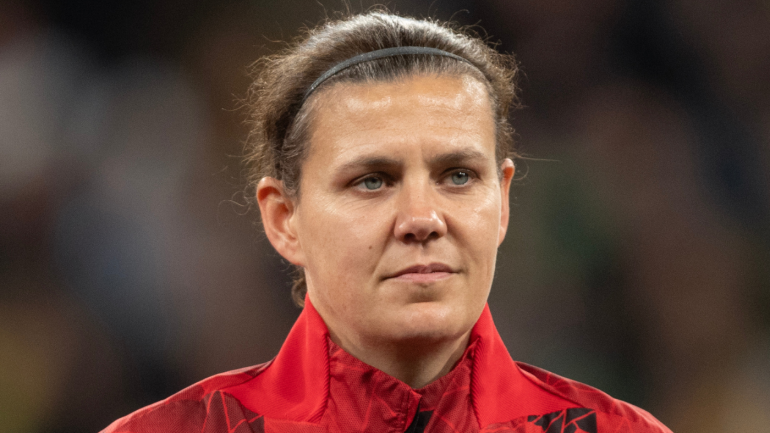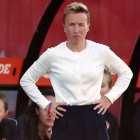
A year of goodbyes in women's soccer comes to a close with one final, monumental sendoff on Tuesday when Christine Sinclair plays her final game for Canada. The 40-year-old will still play another year with the NWSL's Portland Thorns before officially retiring, but this week's match against Australia marks the end in one of the sport's most impressive eras.
Sinclair's accolades speak for themselves. She is soccer's all-time leading goalscorer -- in the men's or women's game -- with 190 goals, amassed over the span of 23 years and 330 matches. She was Canada's most reliable performer for nearly the entirety of her career, showcasing an unmatched nose for goal on different iterations of the team. Sinclair scored in the third-place match during the 2003 Women's World Cup, which Canada eventually lost to the United States, but did not slow her pace despite a rough patch for her national team that saw them exit the group stage in the next two iterations of the tournament. About a decade into her national team career, her talents no longer served as a consolation prize, but rather the driving force for Canada's success -- they won bronze medals at the 2012 and 2016 Olympic Games, and then gold at the pandemic-delayed 2020 Games.

Golazo Starting XI Newsletter
Get your Soccer Fix from Around the Globe
Your ultimate guide to the Beautiful Game as our experts take you beyond the pitch and around the globe with news that matters.
Thanks for signing up!
Keep an eye on your inbox.
Sorry!
There was an error processing your subscription.
Canada's success, led by Sinclair, was not lost on the nation she represented. The 2012 bronze medal was the first time a Canadian team stood on an Olympic podium since the 1936 Games, and is on the receiving end of tributes that only one of the country's greatest sporting icons would enjoy. Vancouver's BC Place, the venue of her final national team game and near her British Columbia hometown of Burnaby, will go by the name "Christine Sinclair Place" for the day, while Billie Jean King and Ryan Reynolds are one of many to share their well wishes.
It is the expectation that someone of Sinclair's stature should be celebrated in such fashion, but the most notable part of her 23 year Canada career was that such attention was hardly a given. She did so quietly and at times exclusively on the pitch, but her undeniable talent and professionalism played a crucial part in shepherding in a new era for women's soccer. The most heartwarming part of her journey is that she got to experience the exponential growth of the game firsthand.
"I think back to the first World Cup that I played in," she said in a recent interview with the CBC. "It was in the U.S. and we finished fourth and aside from your crazy fans, no one cared. No one knew and to see the game where it is now -- countries that you never would have thought become a world power and now are world powers, the investment federations are putting into their women's programs, that leagues are putting into their professional teams, it's exciting. When I'm done playing, I can't wait to just become a fan and watch the game and be in awe of the talent that's out there."
Tonight, two Canada legends take the pitch for the last time 🇨🇦😢
— Attacking Third (@AttackingThird) December 5, 2023
📸 @CANWNT pic.twitter.com/w17sQkJg6O
The global growth of the game has, at times, come at Canada's cost. Sinclair and company were placed in a closely contested group at this year's World Cup and exited in the group stage while Australia and Nigeria advanced, but she is more optimistic about the experience considering the bigger picture.
"The margins in the women's game are now miniscule, whether it's a PK, whether it's an injury or an illness [to a key player]," she said. "The game, it's exciting. I've waited my whole career for the women's game to be where it's at now. Would've been nice to have won a World Cup but it wasn't meant to be."
The one bittersweet aspect about Sinclair's career is that her peak years came just before the sport's evolution into this ultra-competitive era, which would have been an absolute treat to watch. She will thankfully leave the game with a handful of team accolades but was deserving of individual awards, all of which became popularized in recent years. The Best FIFA Football Awards were only launched in 2016, while the first Ballon d'Or Feminin was awarded in 2018, and by Megan Rapinoe's account, Sinclair will be the best to never win one of those two awards.
Christine Sinclair. https://t.co/1RkRStNztf
— Megan Rapinoe (@mPinoe) January 12, 2021
Even without the individual honors, Sinclair's legacy is well and truly intact as a legend of the Canadian women's national team, one of her country's best athletes, and a pioneer of women's soccer. She is one of the leaders of a generation of players in women's soccer who did not merely move the needle, but pushed that needle themselves to ensure the sport could reach the heights it always had the potential to reach. With the likes of Rapinoe and fellow U.S. women's national team veteran Ali Krieger, both of whom retired this year, Sinclair shares the fact that she left the game better than she found it. It is a shame, though, that some power players around her have not matched her approach.
While Rapinoe played her final World Cup after she and her teammates secured a historic equal pay agreement, Sinclair attended her last international tournament in the midst of a labor dispute with Canada Soccer. She spent several weeks in the final year of her international career criticizing the federation's inadequate treatment of their most successful team, especially compared to their male counterparts.
"As a team, we do not trust Canada Soccer to be open and honest as we continue to negotiate for not only fair and equitable compensation and treatment, but for the future of our program," she said during a hearing in the House of Commons that exposed Canada Soccer's rocky financial standing amidst the labor dispute, per the Associated Press.
It is a concern Sinclair expressed once again in the CBC interview.
"Unfortunately, I haven't necessarily seen that growth in Canada," she said about the women's game's rise, "which, as I leave this team, scares me a little bit."
It is the latest chapter in Canada Soccer's neglect for the women's national team, something that Sinclair has unfortunately had a front row seat to. The federation does not have an equal pay agreement in place, and has been criticized in the past for devaluing the team's demand by not manufacturing enough merchandise or hosting enough friendlies. A cloud now hangs over Canada Soccer with its murky finances leading to questions about how it will operate at all for the foreseeable future, which could derail any opportunities for any of the national teams to grow.
The always reliable Sinclair will put her platform to good use, as much as one person can. She is starting a foundation, Girls with Goals, because she believes "that every opportunity that a young boy gets, a young girl should get." Most notably, though, she and ex-Canada teammate Diana Matheson will launch a new professional women's soccer league in their country that is set to kick off in 2025.
As the world order in women's soccer changes dramatically with the arrival of new champions and the departure of old ones, the fact that Sinclair and others in her generation plan to continue the work they have already started feels like the most natural extension of their legacies. The women's game will likely be better for their continuing contributions.
"Even though I might not be on the pitch, I've always got it in me to fight, to help grow the game, whether it's domestically in Canada or internationally," Sinclair assured her audience in the CBC interview. "This game's been my life since I was four so I'm not just quitting cold turkey. I'll still be around."
















